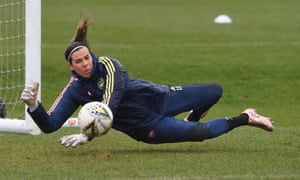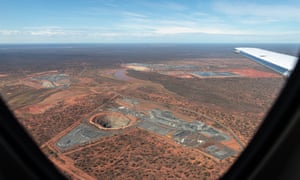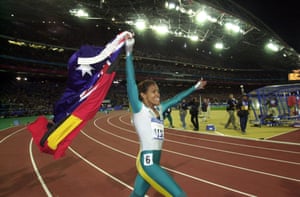Get to know the players in England’s top flight better with our new WSL player in focus series.
When Arsenal’s Lydia Williams was growing up in Western Australia, the daughter of an American mother and Indigenous Australian father, she constantly grappled with her identity.
“Everyone puts such an emphasis on black and white now that when you’re mixed you don’t really fit into either category,” she tells the Guardian. “You can act or be white in some part of your personality and then other sides can be black, but you get judged for it because you haven’t really picked a side or you haven’t really defined who you are.
“All my friends at school were white, but all my family was black. So I’d act a certain way at school and then when I’d leave I’d be something completely different. The hardest thing was working out how to fit into one category or another without being judged, but even then I got judged.”
She didn’t feel guilty or that she was betraying one identity while emphasising another but “I did feel shame in some things”, she says.
“Especially when we went to Canberra to dance at the Parliament House, to do some Aboriginal corroboree there. I think I was eight, and obviously I’m fresh out of the bush, living with no shoes, and just being a little bush kid. I had a mullet, so I was just completely out of sorts. We were at the nation’s capital where there were politicians and everything. And I was probably the whitest kid in the dance crew. I felt like all eyes were on me because I didn’t look like everyone else.
“I didn’t know if people were judging me because I didn’t think that I was black. Or if they were like: ‘Oh, what’s this white kid dancing up here?’ Or they were seeing me with my dad and being like: ‘Oh, my gosh, who’s the mother then?’ That’s when I really started to see that maybe there is a difference, that people judged skin colour.”
The goalkeeper’s dad, Ron, who died when she was 15, was born by a lake and delivered by his grandmother, and had no documentation. He would be part of the stolen generation of Indigenous and mixed-race children removed from their homes and families by federal and state governments. They were put to work or placed in missionaries in the hope the Indigenous population could be bred out of existence.

“My dad wouldn’t really tell me much about it,” Williams says. “I don’t think he even told my mum a lot of things either because it’s just so painful. I know a lot of aunties and uncles in Australia won’t share with their children or their grandchildren what happened because it’s so, so, so painful. I think there’s quite a few families that haven’t been reunited yet because they just don’t know where they got taken. They don’t have the means to find out either.
“A lot of people don’t realise that a lot of these people didn’t go to school or get an education, so what might be seen as easy to find out is actually not.”
The trauma lived by many has manifested itself in various ways. Williams’s dad turned to drink before he found his purpose in missionary work. How he handled his pain and the racism he suffered has shaped Williams – he never apportioned blame. “He understood that people showing hate just didn’t understand what it was like to be black.
“He was just sad that they just didn’t know. I guess that’s how I go and approach things now; you can’t really judge or make a comment on things that you actually haven’t experienced yourself. That’s one of the most important lessons that my parents gave me. That you can sympathise with people, of course, but to judge or lend a comment, or think you understand what they’re going through without going through it yourself? You just can’t do that.”
It was through missionary work that Ron met Williams’s mother, Diana. Born into a military family in Oklahoma, Diana was a teacher and then stockbroker’s assistant on Wall Street before she uprooted and became a missionary in Australia. They married on the site of an Indigenous massacre and got married and honeymooned in a cave.
Williams was born in Katanning, south-east of Perth, but grew up in Kalgoorlie, about 370 miles east. “The town I was in was very racist,” she says. Her school was accepting and inclusive but there was “nothing in school that really taught us about [race] – we were just living it”.

Her dad made sure there was kangaroo tail on the table every Christmas and Thanksgiving, next to her mum’s pumpkin pie. Every year, for about a month, she would travel with her parents, homeschooled by her mum, riding dirt bikes in the bush, playing with their dog and having her eyes opened to “people who don’t have much and that appreciate the land” but also to the struggles of Indigenous communities, such as the lack of schools and hospitals.
“My dad was very passionate about the land and about people. So I learned all about the connection between nature, in Mother Earth, and people and how you treat that. It’s kind of crazy, unless you live it you don’t really understand it.”
Williams has not been back to Kalgoorlie to see her dad’s family in eight years. Playing back-to-back in the US and Australia and now in England has made it virtually impossible. “That’s probably been the hardest thing, not going back into the desert. I definitely do want to, it’s just the life of a footballer.
“Just before my dad passed away, when the doctors told him he only had a day or two to live, I remember he took off his oxygen mask and thanked the doctors and nurses and just said: ‘I just want to let you know the most important thing is to love your family and your friends and thank you for all the work and I’m OK, I’m satisfied with my life.’ That’s what my dad’s taught me, that your family and friends are the most important thing and they’re the people you need to listen to.”

From a sporting point of view, her hero is the Sydney Olympics 400m gold medallist Cathy Freeman who became the second Indigenous Olympic champion, after Nova Peris. “I still get goosebumps whenever I watch that video,” says Williams. “She had the whole nation and a whole culture on her shoulders. And she was just so cool, calm and collected throughout the whole thing. And the whole country remembers it.
“I’d love to do that myself and inspire the next generation of athletes, not just footballers, but athletes and especially Indigenous athletes. There’s such an untapped talent pool there and just love to go out into different communities and just inspire that generation to dream big and make it for themselves.”
Could she emulate the impact of her idol in two years’ time when Australia and New Zealand host the World Cup? “Oh, that would be sick,” she laughs. “Honestly, that would be life-changing.”
from Football | The Guardian https://ift.tt/3ug05lw
via IFTTT

No Comment